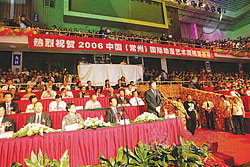
China's cartoon industry is expected to see fast growth in the
next few years with more policy support, investment and
co-operation with other countries.
That was the message at the 2006 China Changzhou International
Animation and Cartoon Art Forum held yesterday.
Taking part were government officials, experts and investors
from China, the Republic of Korea, the United States, Italy,
France, Canada and Japan.
China's animation and cartoon sector experienced a golden age in
the late 1950s and early 1960s.
However, for various reasons such as a lack of funds and
professionals, the industry has lagged behind those in other
countries. Its workers are now in a subcontractor situation for
countries like the United States and Japan, world leaders in the
industry. The two produce high-quality work and yield a total
annual revenue of US$75 billion.
"One of the major reasons for the present situation in China is
the lack of funds," said Wang Hong, president of the Hunan Great
Dreams Cartoon Media Co Ltd (HGDCM), the largest animation and
cartoon production firm in China.
It has been reported that the financial input into animation in
China is just one hundredth of that in the US. Though government
funds are currently the main source of cash, private firms are
being encouraged to invest in the sector. Three local companies
have invested 10 million yuan (US$1.25 million) respectively in the
creation and production of cartoons.
HGDCM has been working with the Changzhou Dinosaur Park on a
365-part serial called The Adventures of Qi Qi and Ke Ke.
It will start tonight on the children's channel of CCTV 7 and last
for a year. It is about two dinosaurs, Qi Qi and Ke Ke.
Changzhou is seen as a pioneer of the Chinese animation
industry.
"We have seen the potential of the animation industry and are
viewing it as a new sector to help with the economic growth of the
city," said Qu Liqin, vice-mayor of Changzhou. "We are co-operating
with other Asian countries to improve the industry's
prospects."
The city government has mapped out a blueprint for the sector
and set up an animation industry base in December 2004.
Since then, over 50 enterprises and companies have settled there
and have already produced more than 100 cartoons.
The Asian Animation Round (AAR) was founded in April this year
and includes companies from China, the United States and the
Republic of Korea.
"What we need to do is to train more people in creative work and
do good marketing," said Park Heung-Soo, president of AAR and
chairman of the Gangwon Information and Multimedia Corporation.
He added: "It might take 10 or more years for Asian countries to
catch up with the United States and Japan, but we are confident
that AAR will play an important role in promoting the development
of the animation and cartoon industry in Asia and the rest of the
world."
(China Daily September 28, 2006)

